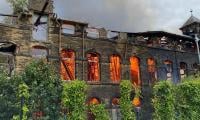Students of Aligarh University played a pivotal role in establishment of Pakistan: Shafi
Rawalpindi Brigadier (r) Iqbal Shafi (Alig) is the only living founder member and Honorary President of Sir Syed Memorial Society, Islamabad. Born in Aligarh on November 30, 1927 and educated at the Aligarh Muslim University (AMU), Brigadier (r) Iqbal Shafi was awarded Pakistan Movement Gold Medal for services rendered during
By Afshan S. Khan
August 19, 2015
Rawalpindi
Brigadier (r) Iqbal Shafi (Alig) is the only living founder member and Honorary President of Sir Syed Memorial Society, Islamabad. Born in Aligarh on November 30, 1927 and educated at the Aligarh Muslim University (AMU), Brigadier (r) Iqbal Shafi was awarded Pakistan Movement Gold Medal for services rendered during 1945-46 for the establishment of Pakistan.
He is actively engaged in running Pakistan Movement Centre dedicated to the youth of Pakistan where regular lectures and seminars are held on subjects such as Islamic values, ideology of Pakistan, character building and leadership. The Sir Syed Memorial Society has already built a memorial of Sir Syed Ahmed Khan in Islamabad, established the Sir Syed Institute of Leadership and is currently engaged in establishing Sir Syed University.
‘The News’ got an opportunity to interview the debonair personality of Brigadier (r) Shafi who actively participated in the movement of Pakistan thus creating a separate homeland for the Muslims of South Asia in 1947.
While reminiscing about his grandfather, Brigadier Shafi said that his grandfather Dr. Abdul Rehman was a medical doctor from KEMC–Lahore in 1895. As a young doctor, he volunteered to go to Iran from India to treat Muslim brethren, suffering from plague which was considered to be a fatal and incurable disease then. He stayed there for three years, earned a name for caring, curing and spending his earnings on poor people. He met Viqar-ul-Mulk at Aligarh and got his three sons admitted at the MAO College High School in 1909, before proceeding for his appointment as British Vice Consul at Jeddah from 1909 to 1914 where he was instrumental in establishing ‘Shifa Khana-e-Hijaz’. He later served as British Consul at Tehran from 1915-1920.
Brigadier (r) Shafi’s father Professor S. M. Shafi graduated from MAO College as it was becoming the Aligarh Muslim University in 1920 and was very proud of the fact that he was the captain of the university hockey team. He proceeded to London for six years, graduated from London School of Economics and then Bar at Law from Middle Temple and returned to Aligarh in 1926. On his return, he was offered lucrative jobs but he decided to serve his alma mater and train Muslim youth in Economics and Commerce. He continued serving there for 30 years till he retired in 1957 as head of the Economics Department and founder head of Commerce Department of the Aligarh Muslim University, having held many additional posts such as proctor of the AMU for 15 years and as provost of the Sir Syed Hall, president of AMU hockey and riding clubs.
Remembering about Quaid-i-Azam, Brigadier (r) Shafi said that Quaid-i-Azam termed coming to Aligarh as his annual pilgrimage and he would always impress upon us to concentrate on our education and not to take part in active politics. “However when he came to Aligarh in 1945, when I was in BA class, he had a changed message altogether, he said that Aligarh is the arsenal of Muslim India. I want you to spread out throughout the length and breadth of India and tell the Muslims to vote for League ticket-holders even if they are lamp posts,” he said.
Brigadier (r) Shafi said that Quaid-i-Azam's speech literally electrified the AMU. Liaquat Ali Khan, an Aligarian, came and sat in one of the students residential hostels -- the Aftab Hostel -- and asked for volunteers. There were about 12,000 students in the university at that time and all of them volunteered. “We were then told to make teams of 7-8 boys the leader to be senior student of MA proficient in national poems, reciting Quranic verses and speeches. In our team I was the youngest member, so when Liaquat Ali Khan asked me that what young man what are you going to contribute I said that I recite Allama Iqbal poems 'Utho meri dunya'. To this, Liaquat Ali Khan replied “Okay okay now don’t waste any more of my time!” Sixty-seven years have passed when that conversation took place and it still brings smile to my face.
Educated at the Aligarh Muslim University, Brigadier (r) Shafi was awarded Pakistan Movement Gold Medal for services rendered during 1945-46 for the establishment of Pakistan.
He was selected for the Indian Army in 1946 and was commissioned in the Pakistan Army and joined the Punjab Regiment in 1948. He graduated from the British Army Staff College, Kimberley, UK, in 1958. He was selected for a four-year course from 1962 to 65 in the Chinese Language which included a two-year term at the Beijing Institute of Languages. He served as instructor at the Pakistan Army Staff College, Quetta, in 69-70 and attended the National Defence College Course in 1971. He was commandant of the School of Infantry and Tactics, Quetta, from 1972-1974. He commanded an Infantry Company and an Infantry Brigade in 1965 and 1971 wars respectively and was awarded Sitara-e-Imtiaz for his meritorious services to the Pakistan Army.
He was defence attache and head of Pakistan’s Military Mission in Beijing from 1975 to 1978.
He was transferred to the Foreign Service of Pakistan and served as minister at the Pakistan Embassy in Beijing from 1978 to 1979. Thereafter, he served as director general (Soviet Union, Warsaw Pact Countries, China and Far East) in the Ministry of Foreign Affairs, Islamabad, with ambassadorial rank from 1979-81.
Brigadier (r) Shafi served as director of the Aga Khan Foundation, Pakistan, for 12 years from 1981 to 1992. In this capacity, his activities included extensive travels to USA, Europe, the Middle East and China.
He was an associate scholar of the Institute of Strategic Studies, Islamabad, and a visiting lecturer at the National Defence College, the Information Services Academy and the Foreign Service Training Institute in Pakistan. He is currently the patron of the All Pakistan-China Friendship Association.
He has lately been appointed an ‘Ambassador for International Peace’ by the Universal Inter-Religious Peace Foundation.
His published books include ‘Long March of the Chinese Army’, ‘History of Muslims in China’, ‘Silk Road to Sinkiang’, ‘History of SSMS”, ‘Talash-e-Manzil’, ‘Talash-e-Sakoon’, ‘Talash-e-Daanish’, ‘Guldasta-e-Tarbiat’, ‘Character Building for Leadership’, ‘Chashm-e-Dil’, ‘Crisis of Leadership in the Islamic World’ and a pocketbook for the guidance of Pakistani Youth titled ‘Siraat-e-Mustaqeem’.
Brigadier (r) Iqbal Shafi (Alig) is the only living founder member and Honorary President of Sir Syed Memorial Society, Islamabad. Born in Aligarh on November 30, 1927 and educated at the Aligarh Muslim University (AMU), Brigadier (r) Iqbal Shafi was awarded Pakistan Movement Gold Medal for services rendered during 1945-46 for the establishment of Pakistan.
He is actively engaged in running Pakistan Movement Centre dedicated to the youth of Pakistan where regular lectures and seminars are held on subjects such as Islamic values, ideology of Pakistan, character building and leadership. The Sir Syed Memorial Society has already built a memorial of Sir Syed Ahmed Khan in Islamabad, established the Sir Syed Institute of Leadership and is currently engaged in establishing Sir Syed University.
‘The News’ got an opportunity to interview the debonair personality of Brigadier (r) Shafi who actively participated in the movement of Pakistan thus creating a separate homeland for the Muslims of South Asia in 1947.
While reminiscing about his grandfather, Brigadier Shafi said that his grandfather Dr. Abdul Rehman was a medical doctor from KEMC–Lahore in 1895. As a young doctor, he volunteered to go to Iran from India to treat Muslim brethren, suffering from plague which was considered to be a fatal and incurable disease then. He stayed there for three years, earned a name for caring, curing and spending his earnings on poor people. He met Viqar-ul-Mulk at Aligarh and got his three sons admitted at the MAO College High School in 1909, before proceeding for his appointment as British Vice Consul at Jeddah from 1909 to 1914 where he was instrumental in establishing ‘Shifa Khana-e-Hijaz’. He later served as British Consul at Tehran from 1915-1920.
Brigadier (r) Shafi’s father Professor S. M. Shafi graduated from MAO College as it was becoming the Aligarh Muslim University in 1920 and was very proud of the fact that he was the captain of the university hockey team. He proceeded to London for six years, graduated from London School of Economics and then Bar at Law from Middle Temple and returned to Aligarh in 1926. On his return, he was offered lucrative jobs but he decided to serve his alma mater and train Muslim youth in Economics and Commerce. He continued serving there for 30 years till he retired in 1957 as head of the Economics Department and founder head of Commerce Department of the Aligarh Muslim University, having held many additional posts such as proctor of the AMU for 15 years and as provost of the Sir Syed Hall, president of AMU hockey and riding clubs.
Remembering about Quaid-i-Azam, Brigadier (r) Shafi said that Quaid-i-Azam termed coming to Aligarh as his annual pilgrimage and he would always impress upon us to concentrate on our education and not to take part in active politics. “However when he came to Aligarh in 1945, when I was in BA class, he had a changed message altogether, he said that Aligarh is the arsenal of Muslim India. I want you to spread out throughout the length and breadth of India and tell the Muslims to vote for League ticket-holders even if they are lamp posts,” he said.
Brigadier (r) Shafi said that Quaid-i-Azam's speech literally electrified the AMU. Liaquat Ali Khan, an Aligarian, came and sat in one of the students residential hostels -- the Aftab Hostel -- and asked for volunteers. There were about 12,000 students in the university at that time and all of them volunteered. “We were then told to make teams of 7-8 boys the leader to be senior student of MA proficient in national poems, reciting Quranic verses and speeches. In our team I was the youngest member, so when Liaquat Ali Khan asked me that what young man what are you going to contribute I said that I recite Allama Iqbal poems 'Utho meri dunya'. To this, Liaquat Ali Khan replied “Okay okay now don’t waste any more of my time!” Sixty-seven years have passed when that conversation took place and it still brings smile to my face.
Educated at the Aligarh Muslim University, Brigadier (r) Shafi was awarded Pakistan Movement Gold Medal for services rendered during 1945-46 for the establishment of Pakistan.
He was selected for the Indian Army in 1946 and was commissioned in the Pakistan Army and joined the Punjab Regiment in 1948. He graduated from the British Army Staff College, Kimberley, UK, in 1958. He was selected for a four-year course from 1962 to 65 in the Chinese Language which included a two-year term at the Beijing Institute of Languages. He served as instructor at the Pakistan Army Staff College, Quetta, in 69-70 and attended the National Defence College Course in 1971. He was commandant of the School of Infantry and Tactics, Quetta, from 1972-1974. He commanded an Infantry Company and an Infantry Brigade in 1965 and 1971 wars respectively and was awarded Sitara-e-Imtiaz for his meritorious services to the Pakistan Army.
He was defence attache and head of Pakistan’s Military Mission in Beijing from 1975 to 1978.
He was transferred to the Foreign Service of Pakistan and served as minister at the Pakistan Embassy in Beijing from 1978 to 1979. Thereafter, he served as director general (Soviet Union, Warsaw Pact Countries, China and Far East) in the Ministry of Foreign Affairs, Islamabad, with ambassadorial rank from 1979-81.
Brigadier (r) Shafi served as director of the Aga Khan Foundation, Pakistan, for 12 years from 1981 to 1992. In this capacity, his activities included extensive travels to USA, Europe, the Middle East and China.
He was an associate scholar of the Institute of Strategic Studies, Islamabad, and a visiting lecturer at the National Defence College, the Information Services Academy and the Foreign Service Training Institute in Pakistan. He is currently the patron of the All Pakistan-China Friendship Association.
He has lately been appointed an ‘Ambassador for International Peace’ by the Universal Inter-Religious Peace Foundation.
His published books include ‘Long March of the Chinese Army’, ‘History of Muslims in China’, ‘Silk Road to Sinkiang’, ‘History of SSMS”, ‘Talash-e-Manzil’, ‘Talash-e-Sakoon’, ‘Talash-e-Daanish’, ‘Guldasta-e-Tarbiat’, ‘Character Building for Leadership’, ‘Chashm-e-Dil’, ‘Crisis of Leadership in the Islamic World’ and a pocketbook for the guidance of Pakistani Youth titled ‘Siraat-e-Mustaqeem’.
-
 Why Prince Harry, Meghan 'immensely' Feel 'relieved' Amid Andrew's Arrest?
Why Prince Harry, Meghan 'immensely' Feel 'relieved' Amid Andrew's Arrest? -
 Jennifer Aniston’s Boyfriend Jim Curtis Hints At Tensions At Home, Reveals Rules To Survive Fights
Jennifer Aniston’s Boyfriend Jim Curtis Hints At Tensions At Home, Reveals Rules To Survive Fights -
 Shamed Andrew ‘dismissive’ Act Towards Royal Butler Exposed
Shamed Andrew ‘dismissive’ Act Towards Royal Butler Exposed -
 Hailey Bieber Shares How She Protects Her Mental Health While Facing Endless Criticism
Hailey Bieber Shares How She Protects Her Mental Health While Facing Endless Criticism -
 Queen Elizabeth II Saw ‘qualities Of Future Queen’ In Kate Middleton
Queen Elizabeth II Saw ‘qualities Of Future Queen’ In Kate Middleton -
 Amanda Seyfried Shares Hilarious Reaction To Discovering Second Job On 'Housemaid': 'Didn’t Sign Up For That'
Amanda Seyfried Shares Hilarious Reaction To Discovering Second Job On 'Housemaid': 'Didn’t Sign Up For That' -
 Hilary Duff Reveals Deep Fear About Matthew Koma Marriage
Hilary Duff Reveals Deep Fear About Matthew Koma Marriage -
 Will Sarah Ferguson End Up In Police Questioning After Andrew’s Arrest? Barrister Answers
Will Sarah Ferguson End Up In Police Questioning After Andrew’s Arrest? Barrister Answers -
 Matthew McConaughey Gets Candid About AI Threat To Actors: 'Be Prepared'
Matthew McConaughey Gets Candid About AI Threat To Actors: 'Be Prepared' -
 Hailey Bieber Shares How 16-month-old Son Jack Blues Is Already Following In Justin Bieber's Footsteps
Hailey Bieber Shares How 16-month-old Son Jack Blues Is Already Following In Justin Bieber's Footsteps -
 Zuckerberg Denies At LA Trial That 'Instagram Targets Kids' Amid Addiction Claims
Zuckerberg Denies At LA Trial That 'Instagram Targets Kids' Amid Addiction Claims -
 France Sees Record 102mn International Tourists In 2025
France Sees Record 102mn International Tourists In 2025 -
 Inside Jennifer Aniston's Intense Fitness Routine Ahead Of Rumoured Wedding To Jim Curtis
Inside Jennifer Aniston's Intense Fitness Routine Ahead Of Rumoured Wedding To Jim Curtis -
 Hailey Bieber Shares Health Worries After Facing Stroke And Heart Issue
Hailey Bieber Shares Health Worries After Facing Stroke And Heart Issue -
 Bunnie Xo Reveals Why Jelly Roll Refused To Read Her New Memoir Until Release
Bunnie Xo Reveals Why Jelly Roll Refused To Read Her New Memoir Until Release -
 'Peaky Blinders' Shooting Site In Flames As New Movie Trailer Teases Father-son Clash
'Peaky Blinders' Shooting Site In Flames As New Movie Trailer Teases Father-son Clash



